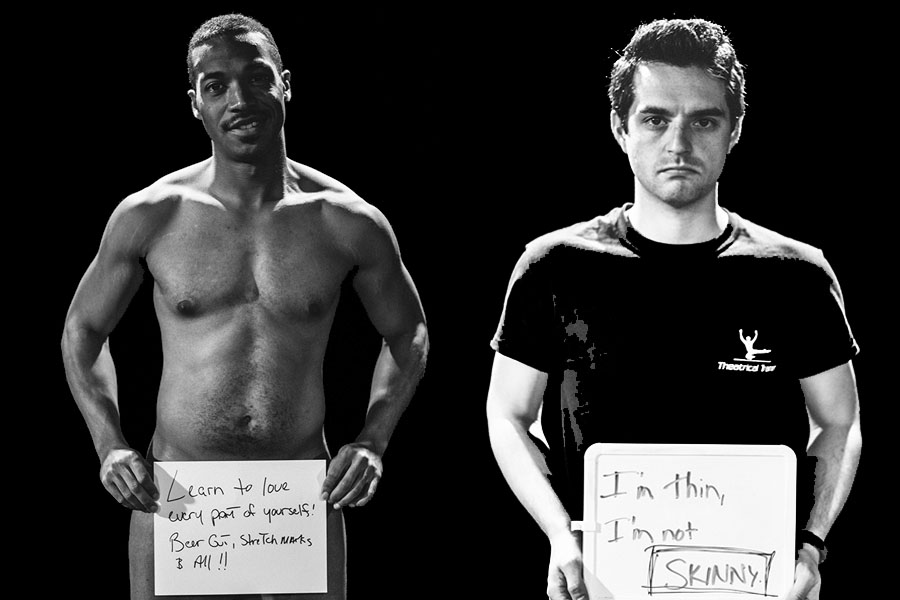The Plays and Players Theatre in Center City buzzed with creative energy on the morning of Oct. 14 for the photo shoot of a new theatrical production focusing on body image and body dysmorphia from an eclectic range of voices in the Philadelphia community.
The project is the brainchild of the members of Theatrical Trainer, a local theatrical and in-home personal-training company. The images from the photo shoot will be part of the production for “The Body Aesthetic Project,” which will premiere in the 2018 Philadelphia Fringe Festival.
Peter Andrew Danzig, the founder of Theatrical Trainer, spoke about the relationship between body image and the creative arts.
“Theatrical Trainer was birthed out of an effort to provide wellness opportunities; by wellness, we don’t only mean personal training and wellness in terms of exercise, we mean wellness as a whole: mental, emotional, physical. It’s really a full package,” Danzig explained. “What we’ve noticed over the last couple years is the people we work with really struggle with the sense of body image in the creative arts and that can go anywhere from an actor and a dancer, all the way through a painter, but many times what we utilize to find our value or ‘worth’ to the world is through an image. Whether you’re handing a head shot, whether you’re showing a painting, that is where people place so much emphasis on you as a person.”
It’s a interesting dichotomy, he noted, for actors to rely on headshots for auditions in an industry that so often promotes individuality and free expression.
“Body image is a very, very important thing and obviously it lives in type-casting, diversity, inclusiveness,” he said. “Those dialogues are just starting to happen now, but our industry, ironically, many times kind of takes it at a base level and this is our venture in trying to open up the dialogue and say, ‘We’re all feeling this, let’s talk about it.’”
Last weekend’s photo project allowed the local community to pose with a sign exploring their ideas about body image.
Lauren Fanslau, the head of choreography and dance pedagogy at Theatrical Trainer, added that the project’s strength lies in the voices of the community.
“I think one of my biggest goals for today is to be surprised by what people bring to the table because, as far as this specific project goes, we’ve been already talking for months and months about our feelings and our experiences on these topics, but in our personal and professional relationships we have been talking for years about this,” she said. “We very much understand our takes on these topics as a group, but I really want to be surprised by other people on what they fill out in the survey, what they decide to write on the sign, what kind of photos they want to take.”
The voices of the LGBT community play a prominent role in the creation of “Body Aesthetic” as well. Richie Sklar, the education associate for Theatrical Trainer, touched upon this topic.
“I think as members of the LGBT community, it is very apparent to us about how others perceive our bodies,” Sklar said. “I think that when people think of the LGBT community they think that, if you identify as a lesbian, then you are one thing. If you identify as a gay man, then you are one thing. If you identify as this, that or the other thing, you’re one category of person. And I think it’s really important, especially for me as the education associate, to say that there is more than one body. People can’t be categorized that easily and shouldn’t be categorized that easily, but unfortunately that’s what we do. I think it’s a really big problem in the LGBT community.”
Fanslau elaborated on her hopes for the project moving forward.
“This conversation [about body aesthetic] has been going on for a very long time, but I feel like it goes on in people’s homes or in private conversations and it’s a bit taboo. If you’re talking to a larger group of people and you say something that offends someone or it’s just a little too sensitive, people don’t feel comfortable talking about these issues in a larger group. I think one of our hopes, among many, is that this brings the conversation to the forefront and that it makes it much more acceptable to open up to people about these issues and also understand them a lot better.”
For more information about Theatrical Trainer, visit http://www.theatricaltrainer.com/personal-trainingconditioning.html.

